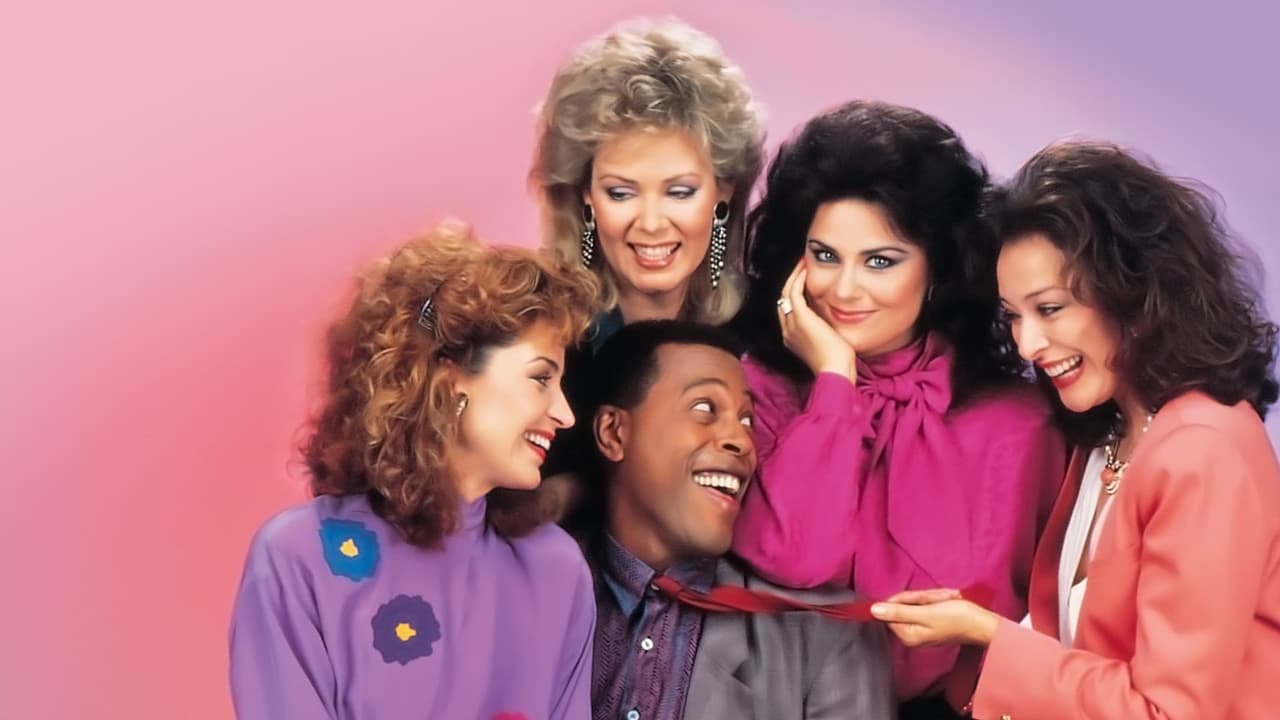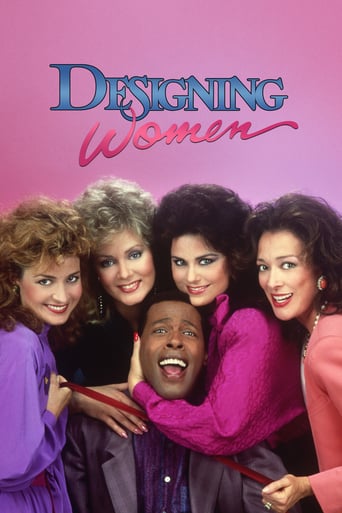Inclubabu
Plot so thin, it passes unnoticed.
Tedfoldol
everything you have heard about this movie is true.
Infamousta
brilliant actors, brilliant editing
Dynamixor
The performances transcend the film's tropes, grounding it in characters that feel more complete than this subgenre often produces.
clive-13
This show along with The Golden Girls were the only reasons to watch TV during the last half of the 1980's. Thank God that both series are in syndication and can be seen on numerous channels today. Designing Women was the warmer of the two series, particularly the first five years before the change of cast. Just great writing and brilliant acting took this series to the very top of comedy shows. It was always a hoot to see all the girls supposedly working in an interior decorating company when they never appear to actually be working. Many of the shows featured Julia singing and those were the shows that I liked the best. My other favorite character was played by Jean Smart who unfortunately left the show after the fifth season when she married Bill the serviceman. All in all such a wonderful entertaining show that can still be seen today.
Syl
One of things that bothered me about Designing Women was the loss of Delta Burke and Jean Smart leaving the show. Saturday Night Live's Jan Hooks and Newhart's Julia Duffy joined the cast but the show was never the same again. Alice Ghostley and Meshach Taylor were regulars in supporting roles. I remember watching this show on Monday nights when it first aired. They were four loud, opinionated, Southern broads with a sense of humor and chemistry. I truly could believe that Suzanne and Julia played by Dixie Carter and Delta Burke were sisters. I didn't care about Suzanne or Delta's weight. It wasn't an issue but people in Hollywood think that weight is a bigger issue than it should be. Anyway, I never saw the four women ever appear to be working. The place didn't look like an office but an actual house. I know they were supposed to be interior designers but I never saw them do any work. Anyway Annie Potts and Jean Smart were great as the divorced mom and single receptionist. I remember the episode in which Julia was a juror and she was invited to meet President Carter and his wife. Well she missed the dinner but they invited her for desert because of her obligations. It was a well-written show too and very well acted.
dwr246
This was a delightful series that had a little trouble catching on, and never recovered after two of the major players left at the same time. In its halcyon days, it was witty, irreverent, intelligent, and altogether a lot of fun.The series revolved around four women who ran a design firm together in Atlanta, Georgia. Julia Sugarbaker (Dixie Carter) was an intelligent and outspoken woman, who ran the business out of her house. Her sister Suzanne (Delta Burke) was an oft married - and divorced - aging beauty queen, who, while also outspoken, lacked her sister's intelligence and sensitivity. Mary Jo Shively (Annie Potts) was a divorced mother of two, still trying to get her confidence back after the end of her marriage. Office manager Charlene Frazier (Jean Smart) was a country girl with a heart of gold, if not the most sense in the world. They were assisted by delivery man, and eventual partner, Anthony Bouvier (Meshach Taylor), the lone male and the lone black in the business, an ex-con who seemed surprisingly comfortable spending the bulk of his time with four white women. After Burke and Smart left the show in 1991, two new characters were introduced, Allison Sugarbaker (Julia Duffy, the kiss of death to every sitcom she's ever been in except for Newheart), an erstwhile cousin who was obnoxious, self absorbed, and completely unlikeable, and Carlene Dobber (Jan Hooks), Charlene's sister, who was nothing but a dim witted country bumpkin. Fortunately, Duffy left after a year, but by then it was too late to save the series, which limped along to its close with Judith Ivey playing a new partner, the rich, widowed B. J. Poteet.Guest stars were frequent, and several played characters which recurred with great frequency. Hal Holbrook (Carter's real life husband) played Reese Watson, Julia's love interest for the first several seasons until he left to do Evening Shade. Gerald McRaney (who eventually became Burke's real life husband) played one of Suzanne's ex-husbands. Richard Gilliland (who married Jean Smart after meeting her on the set - see the pattern here) played Mary Jo's boyfriend for the first few seasons. And the dashing Douglas Barr (who apparently was not involved with any other cast member) played Col. Bill Stillfield, the man Charlene eventually married. The favorite by far, however, was Alice Ghostley as Bernice Clifton, an eccentric with a joie de vivre which left the others stunned.In the beginning, the series sparkled with wit and humor as it dealt with the lives of these four women, so different, and yet so similar. Julia's passion for life, justice, and feminism was revealed in fiery, but incredibly humorous long winded speeches. Suzanne's brash self-absorption contrasted well with her vulnerability and her loyalty to those she loved. Mary Jo's growing sense of self was handled quite well. And Charlene's hopeless romanticism culminated in her marriage and her gracefully rising to the challenges of being a military wife and a working mother. In its hay day, the series also took on some interesting issues - AIDS, sexuality, death and dying, menopause, among others. Unfortunately, after Burke and Smart left, the writing took a turn for the worse, losing its sparkle, and settling for silliness instead of wit.Like many sit-coms of its era, this one stayed on the air a little too long, and I personally found the last two seasons very regrettable. But the rest of the series was a jewel which still gives pleasure to those who view it.
mark.waltz
One of the funniest "Designing Women" moments never even happened on the show; it was on the short-lived series "The Edge". Shortly after Julia Duffy came on the show, "The Edge" spoofed the show in a hilarious skit where a 50-foot Delta Burke shows up, rips off the roof, and after exchanging some wise cracks with the group, eats one of them (Julia, I think), then storms through Atlanta creating havoc. Although the written description of this skit can't possibly describe its hilarity, it did spoof the irreverance of the character's sense of humors and their relationships with each other. Terminator Julia (Dixie Carter, my favorite) had a loving if strained relationship with her selfish sister Suzanne (Delta Burke), while sassy but sensible Mary Jo (Annie Potts) had a very close friendship with all of them, especially the not-so-dumb Charlene (Jean Smart). Charlene was more of an innocent, lost in her own naive world yet was quite intelligent in her own way. The "fifth" of the clan was black ex-con Anthony (Meshach Taylor) who had a way of always walking in during a "female" discussion which would ultimately embarrass him. Then, there was a bizarre array of recurring characters, most notably the wacky Bernice (Alice Ghostley), the dizzy senior citizen "with the arterial flow problem to the brain", who always had a wonderfully hilarious comment for everything. She reminded me of the hard-of-hearing Emily Latella from "Saturday Night Live" with her wacky comments, and every episode with her was a highlight of the show. Carter's real-life husband, Hal Holbrook, was memorable as well as Julia's attorney lover.Yes, there were some serious social issue episodes, but this was a show created with that purpose. The writers were not afraid to explore these issues, and in most cases, they were very successful. I adored Julia because she was not just a one-dimensional opinionated woman; she showed tenderness on many occasions. However, cross her with an issue which upset her, and you would feel her wrath. She often exploded on Suzanne, but on a few occasions, she felt a true sympathy for Suzanne's well- meaning flaws. She also had a soft spot for Anthony, and was proud of the fact that he could put his past behind him and become successful. Suzanne on the other hand had a soft spot she hid behind her seemingly selfish nature. She could be self- serving at one moment, then totally sympathetic the next. Her love/hate relationship with Anthony was one of the show's highlights, as was her hysterical love for her pet pig, Noelle. Mary Jo was probably the most sensible of the four women; unlike Julia, she saw things from a more widened point of view. Wacky situations came to her by chance; she didn't invite them like the others did because of their eccentricities. Charlene was both touching and funny, an innocent woman the others felt they had to protect. However, she had a strong streak out of her goodness and big heart, winning the respect of the others at Sugarbaker's. Julia Duffy came on after Delta Burke's departure. As the obnoxious Allison, Julia's cousin, Duffy played a character hiding behind her deep insecurities by being overly obnoxious and opinionated. While she could be funny, her character was not as developed as the other women. Jan Hook's Carleen was funny and lovable; not naive like sister Charlene, but more of an overly happy woman. I loved when she tried to be more like Julia because she looked like a little girl playing dress-up. I only saw a few episodes with Judith Ivey, whom I think is one of the funniest women on TV today. I found her character much more likable than either Suzanne or Allison, making her fit in better as the show concluded. Yet, she was not overly nice like Carlene or Charlene, but just a good old gal whom everybody could not help but love. "Designing Women" itself could be hysterical (Julia getting her head stuck in a bannister; Bernice having a nose job and looking like Miss Piggy; Suzanne gluing her lips shut, etc....) or very, very touching. The episode which stands out as the most touching was the hour-long episode where Charlene gives birth, and Julia meets a 100 year old black woman (played by the fabulous Beah Richards). Who could not help but weep when Charlene is handed her baby while angel Dolly Parton escorts the old woman, who has died, into heaven, while she is singing "Somewhere Out There". It was presented in a way which was full of emotion; human, yet not manipulative. It is an episode I watch between Christmas and New Year's every year (as it took place on New Year's Eve 1989) and consider one of the best sitcom episodes ever made. "Designing Women" slowly shrunk in ratings after the departure of Delta Burke, but went out on a high note with a "Gone With the Wind" spoof where all of the female characters (including Bernice) fantasize about being Scarlett O'Hara. To end the series, the producers gave a wonderful closing to the delightful Alice Ghostley by having her have the last moments to herself of the series as she fantasizes about Anthony being Rhett to her Scarlett. It was a hysterically funny (and touching) way to end a fabulous show.

